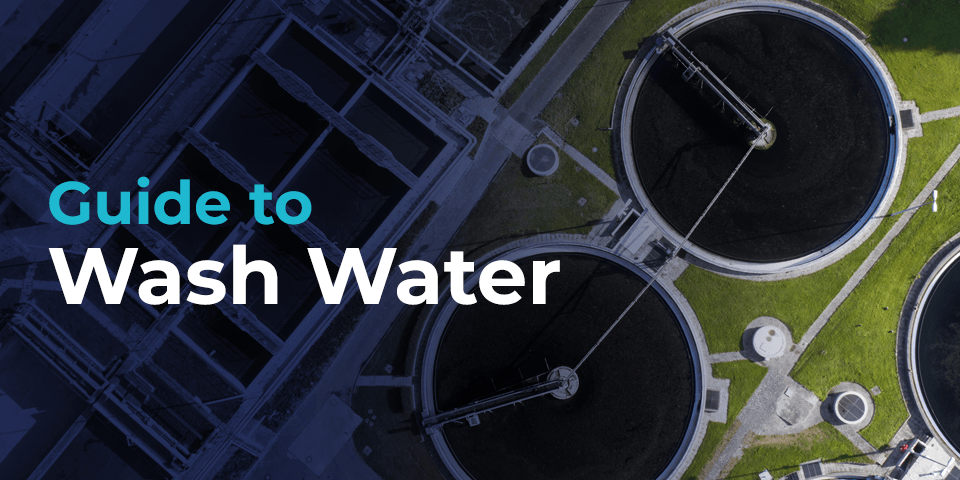
Various industries use wash water to clean heavy equipment and parts. While this practice is essential, it uses significant amounts of water and can send harmful contaminants into the environment.
Companies can help conserve water and protect the water supply by recycling wash water. Closed-loop wash water stations effectively collect and treat wash water so businesses can use it repeatedly instead of returning it to natural sources and using more water.
Recycling wash water is an excellent way to save money while benefiting the environment, and innovative solutions make it easy to treat and reuse wash water on-site. Continue reading to learn more about the importance of wash water recycling and how to start conserving water.
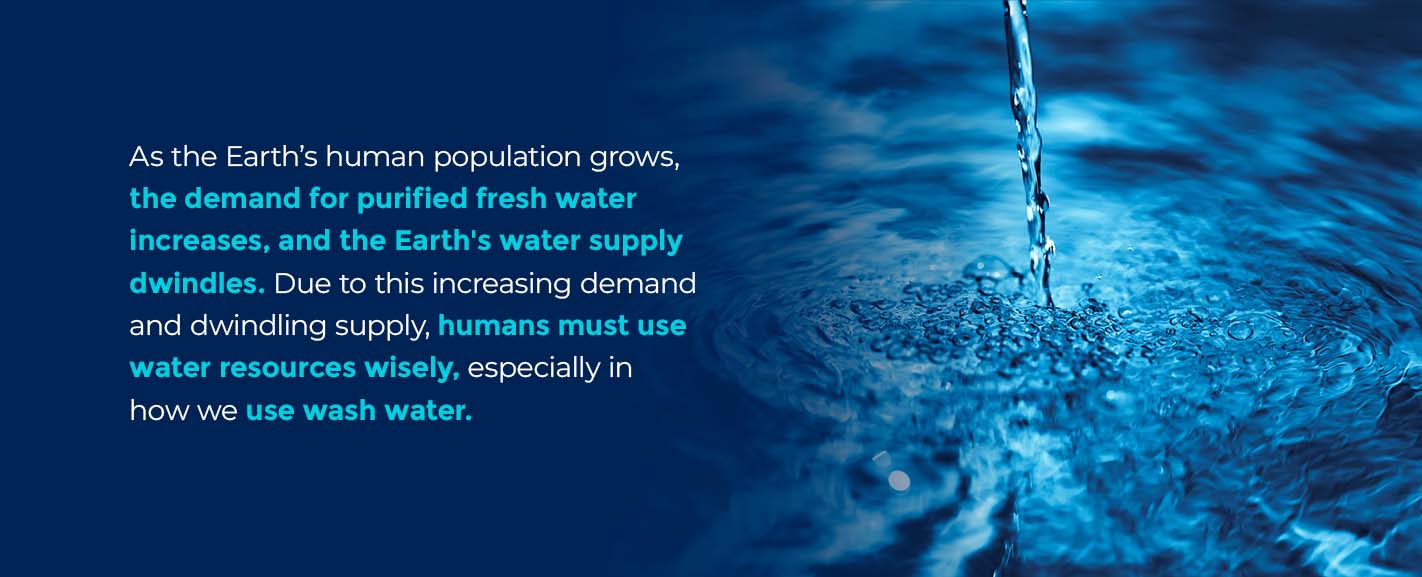
The Importance of Recycling Wash Water
Recycling wash water is crucial because it conserves water, which is a precious and limited resource. Many people take their water supply for granted. Some are fortunate enough to live where they seem to have a virtually unlimited water supply.
Given that water covers most of the Earth, it might appear that we’ll never run out of a clean and dependable water supply. However, very little water on the Earth is safe and consumable. On a perfect Earth, water sanitation would not be a problem, but it is a task we must approach responsibly.
According to the United States Geological Survey, nearly 97% of the Earth’s water supply is saline or salty. It’s non-potable and unfit for human consumption or general utility use. Approximately 2% of the water on Earth is frozen as ice. This leaves only 1% of available fresh water for human consumption and use. People can use fresh water in the form of goods such as drinking and irrigation water, or they can use it for services such as generating hydroelectricity, supplying recreation or washing equipment.
As the Earth’s human population grows, the demand for purified fresh water increases, and the Earth’s water supply dwindles. Due to this increasing demand and dwindling supply, humans must use water resources wisely, especially in how we use wash water. Recycling wash water is a top conservation method, and it protects our precious resources for ourselves and future generations. Water filtration technology is essential to preserving the Earth’s water supply.
What Is Wastewater?
Wash water, or wastewater, is any water used to clean or wash materials. It can be anything from the water you use in your shower to the water you use to wash your car. The industrial and commercial equipment washing industry also consumes a significant amount of wash water.
Washing commercial equipment such as heavy machinery or golf course management vehicles requires a great deal of water. Fortunately, most of the commercial wash water companies consume daily is recyclable. To recycle wash water, organizations contain it, clean it until it’s in a “gray” water state and reuse it on a continuous cycle. Recycled wash water never enters the environment’s water table and does not contribute to pollution problems.
Gray wash water is unsuitable for human consumption, unlike potable water, which is safe for consumption. While people can’t drink gray water, recycled gray water is perfect for washing equipment and equipment parts at wash stations across the nation and around the world. Advanced technology now allows businesses to implement dependable water treatment processes at an affordable cost.
Today, it’s typically much more economical to recycle wash water that continuously runs through fresh supplies. It’s also more ethical and responsible for the environment to reuse wash water rather than waste it. Collecting wash water, treating it and recycling it continuously is simply the right thing to do.
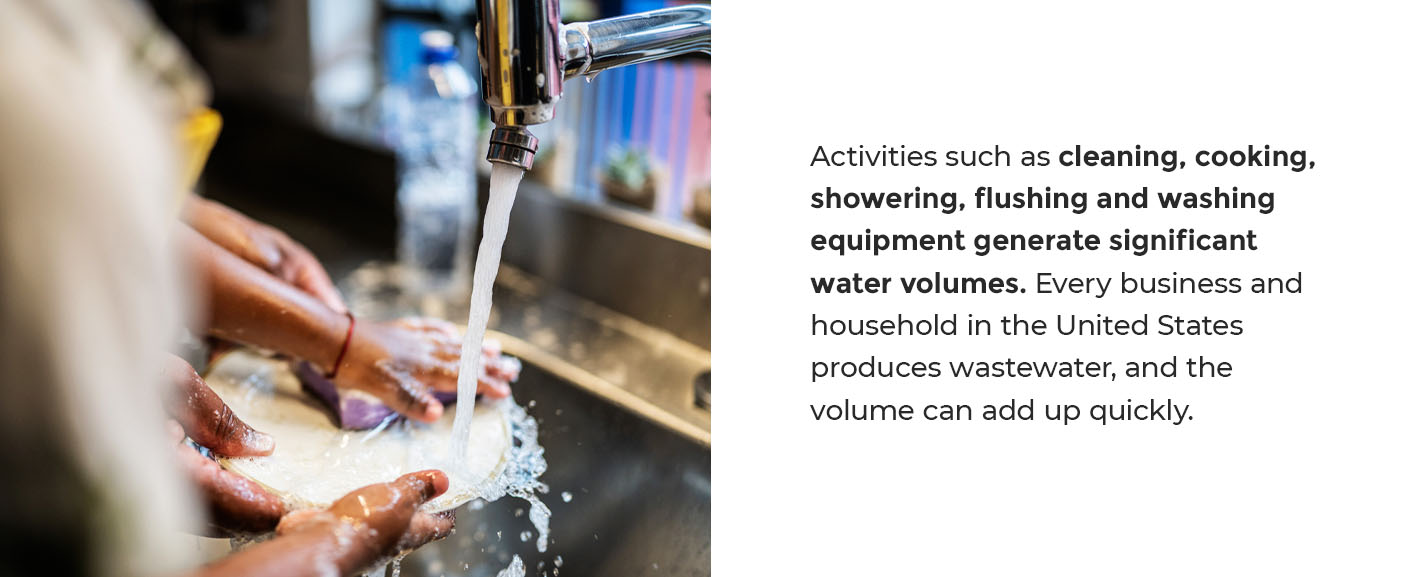
How Is Wastewater Created?
Activities such as cleaning, cooking, showering, flushing and washing equipment generate significant water volumes. Every business and household in the United States produces wastewater, and the volume can add up quickly. Most of the activities that create wastewater are necessary, but the resulting by-products usually enter natural resources or treatment systems, reducing the amount of potable and usable fresh water.
The biggest wash water consumers are commercial and industrial businesses that use a large and reliable water supply for equipment upkeep. However, these consumers have control over their water supply and can invest in washing stations that contain, treat and repeatedly recycle a single water supply. The largest industries that use significant wastewater amounts consist of the following:
- Golf Course Maintenance and Turf Care
- Commercial Car Washes
- Heavy Equipment Operators
- Auto Parts Recyclers
- Soil and Ground Water Remediation Professionals
- Oil and Gas Industry
- Mines and Mining Equipment Services
- Equipment Rental Companies
- Food Processors and Warehousing
- Military Fleet Operations
These industries are the most common wastewater generators, but there are countless businesses and organizations that produce wastewater. Various situations have different washing requirements, but all water consumers can conserve water. Each business that uses wash water can collect, contain and recycle it using equipment washing stations.
How Is Wastewater Collected?
Equipment washing stations can collect wastewater in one of two ways. Open-loop and closed-loop systems operate differently, and closed-loop systems are the most beneficial option.
Open-loop systems allow wash water to exit down a drain, enter a storm sewer and continue to a natural destination. When water travels through an open-loop system, it carries every contaminant that it collected before entering the system. Any dirt, oil, grease, chemicals and detergents that contaminated the water during wash processes remain in the water as it moves through the sewer, allowing pollutants to damage the environment.
Responsible equipment wash stations use a closed-loop system. Closed-loop systems trap all wash water in a physical containment rack or pad. This prevents all polluted water from escaping the system, which protects the environment from damage and helps businesses comply with Environmental Protection Agency water regulations.
Closed-loop stations collect and treat wastewater to remove contaminants and solid matter. The treatment process also reduces fine particulates to decrease water turbidity, which refers to the water cloudiness or haze caused by suspended sediments.
When a closed-loop rack or pad collects or reclaims water, the water enters a drain and flows through a filtration system. Closed-loop stations biologically treat wastewater to remove gunk and grime before re-pressurizing and returning the water to the washing service within the closed loop. This allows businesses to use the same water supply or volume repeatedly and avoid releasing it into the open environment.
Benefits of Reusing Wash Water
Ethically, reclaiming wash water is a sound and responsible move. Everyone has a moral obligation to conserve water and reduce our environmental impact. Companies that consume large amounts of water to clean and service their equipment should make every effort possible to conserve water. They can make a significant impact on the environment and conserve a great amount of water.
Reclaiming, treating and reusing wash water also has economic benefits. Water can be expensive when a metered system supplies it. Recycling wastewater can significantly reduce water bills because it eliminates the need to use metered water. Wastewater treatment systems provide a significant return on investment because they help businesses reduce their water bills and add to their bottom line.
Reducing or eliminating pollutants is highly ethical and thoroughly responsible. Preventing wash water pollutants is also economically wise, considering the many federal, state and local regulations governing water use and waste discharge. Using a closed-loop wash water system helps businesses remain compliant with regulations, allowing them to avoid massive water and soil pollution fines. The government regulates water use and prevents pollution with various laws such as the following:
- Clean Water Act
- Comprehensive, Environmental Response, Compensation, and Liability Act
- Federal Insecticide, Fungicide, and Rodenticide Act
- Hazardous Materials Regulations
- Oil Pollution Act
- Resource Conservation and Recovery Act
- Safe Drinking Water Act
- Toxic Substance Control Act
These comprehensive and extensive laws regulate all forms of chemical, biological, toxic and radiological impurities that can pollute any part of the environment’s water supply. Reusing wash water is a responsible way to avoid conflict with environmental enforcement agencies.
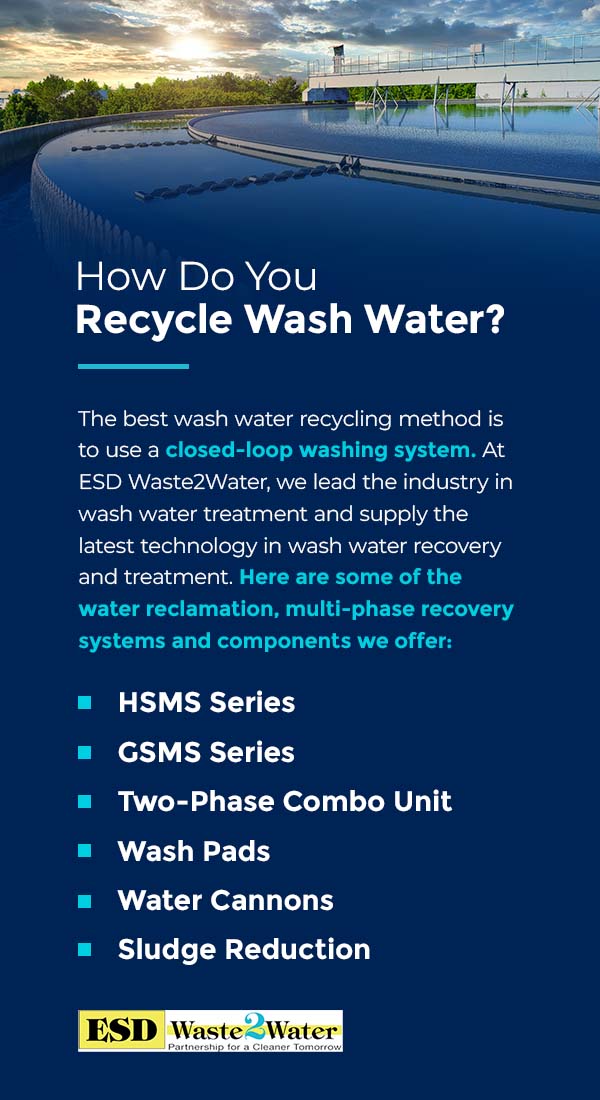
How Do You Recycle Wash Water?
The best wash water recycling method is to use a closed-loop washing system. The word “system” is often overused, but closed-loop stations do use a systematic approach to cleaning various types of equipment. Closed-loop systems contain numerous components that work together, or systematically, to capture, clean and recycle wash water.
A wash water containment system’s primary component is its pad or rack. This is the surrounding or base where businesses place their parts or equipment for washing. Equipment wash pads or racks can be fixed in place, or they can be portable. Whether it’s fixed or portable, the surrounding is leak proof and doesn’t allow any water to escape during the washing process.
Closed-loop station water cannon pressure washers dispense water onto the equipment under force. This water supply typically contains a detergent or degreaser, and it can be either cold or hot. Contaminants break free from a surfactant action, and they fall via gravity to sump drains in the containment pad’s base. From there, a sump pump re-pressurizes wash water and sends it through a filtration process that removes contaminants. The clean water then returns to the cannon or pressure nozzle, and the cycle continues.
At ESD Waste2Water, we lead the industry in wash water treatment and supply the latest technology in wash water recovery and treatment. Here are some of the water reclamation, multi-phase recovery systems and components we offer:
- HSMS Series: The Heavy Solids Management System is designed and built for large industrial operations. The ESD Waste2Water Models 750, 850 and 1500 handle heavy-duty cleaning jobs by effectively removing solid waste and treating the wash water.
- GSMS Series: The Golf Solids Management System specializes in cleaning golf course equipment like mowers, tractors and carts. ESD Waste2Water Models 700 and 800 work with optional grass-clipping separators to break down organic hydrocarbons and suspend solids in one compact system.
- Two-Phase Combo Unit: This is our next-generation wash water reclamation unit. It incorporates a two-phase biological treatment system that converts organics like grease, oil and fuel into carbon dioxide and water. The by-product is near-clear “gray” water.
- Wash Pads: Custom portable wash racks or pads are the staple workhorse of any wash water containment system. They’re available in fixed and portable models that can be set up anywhere. Generally, there’s no permit required, and our wash pads are 100% closed-loop containments.
- Water Cannons: When regular pressure washers are too small for large jobs, powerful water cannons can flush heavy debris like mud off large equipment. Water cannons are integral components with ESD Waste2Water Biological Treatment Systems.
- Sludge Reduction: The Rotary Drum Vacuum System reduces the amount of sludge material to handle and removed by a certified hauler.
What Are Turbidity and Clarity Levels of Recycled Waste Water?
Turbidity is a common phrase heard in the water business. It refers to the water’s clarity level. Turbidity is also known as haze or sediment impurity contained in a water sample.
Turbidity is a key water quality test. It’s the measure of the relative clarity affected by suspended sediments, and it has several recognized standards. In America, technicians measure water turbidity in Nephelometric Turbidity Units (NTU). European countries tend to use the Formazin Turbidity Unit, which is also called the Formazin Nephelometric Unit. Some parts of the world also the Jackson Turbidity Unit measurement.
Regardless of the name, turbidity is a crucial indicator of a water sample’s state, especially when it comes to drinking water. In the U.S., the maximum allowable safe limit for potable water is 1.0 NTU. This is a strict standard considering the World Health Organization sets a 5.0 NTU barrier for safe water consumption.
Commercial wash water turbidity levels are more forgiving. A typical water turbidity level of 250 to 450 NTUs would appear tea-like. GSMS and HSMS wash water systems from ESD Waste2Water treat reclaimed water to the 20 to 50 NTU level. Recycled water from our wash pads appears slightly cloudy but remains within the required levels for washing purposes.
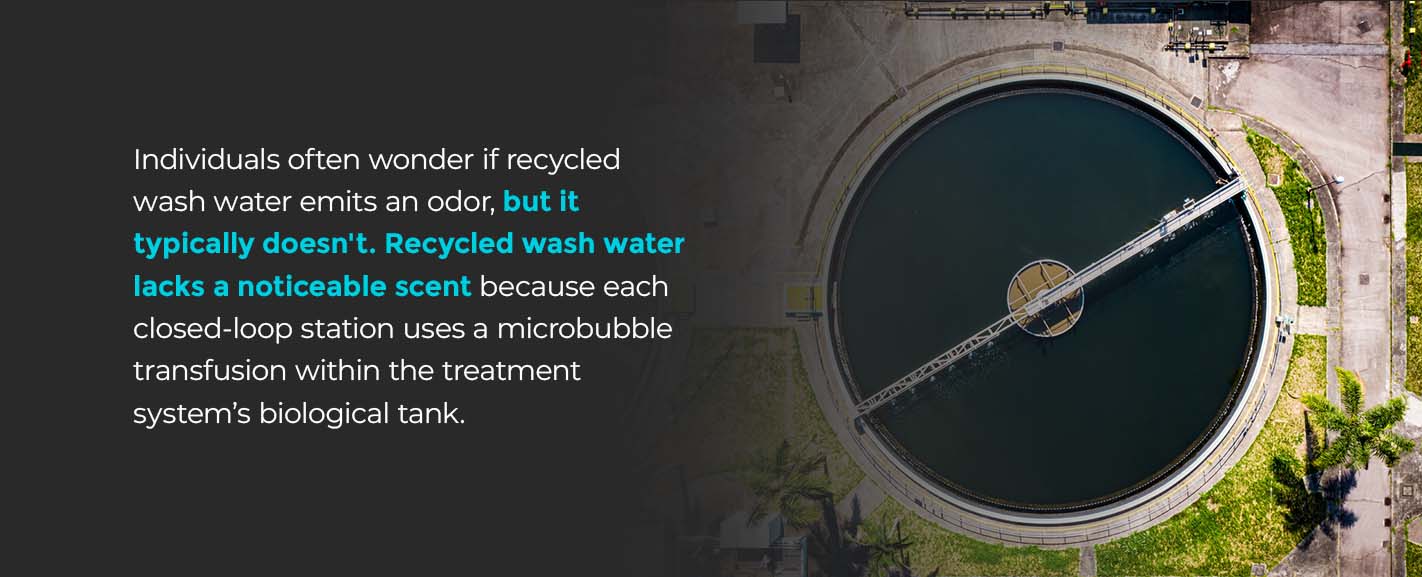
Does Recycled Wash Water Have an Odor?
Individuals often wonder if recycled wash water emits an odor, but it typically doesn’t. Recycled wash water lacks a noticeable scent because each closed-loop station uses a microbubble transfusion within the treatment system’s biological tank. Oxygen transfers to aerobic microbes that help ensure the internal environment contains more than 12 milligrams per liter of dissolved oxygen. In this state, aerobic microbes break down organics that cause unpleasant odors.
When using an ESD Waste2Water closed-loop wash water containment system, you won’t notice any odd smells unless dirty equipment emits an odor. Even compatible detergents can be odor-free. Our water containment systems don’t require operators to wear any breathing equipment or respirators. Reclaimed water from an ESD Waste2Water system is harmless to the lungs, eyes and skin.
How Much Wash Water Is Recycled?
ESD Waste2Water systems recycle as much water as possible during their operation. It’s difficult to put this in a percentage, but it’s safe to say that no liquid water escapes into the ground or other potable water supplies. This is an assurance you can be guaranteed when investing in ESD Waste2Water recycling systems.
Some of the treated water supply evaporates or is lost through overspray. This is to be expected, especially when working in hot and windy conditions. Some operator control and diligence are expected to make an ESD Waste2Water wash water recycling system perform at its peak. When the station is used correctly, there’s no need to worry about how to dispose of dirty water because the system takes care of it.
How ESD Waste2Water Can Help
ESD Waste2Water is a Central Florida company specializing in the design, manufacturing, installation and service of wastewater management equipment. We serve customers in the United States, Canada, Europe, Australia and South America. ESD Waste2Water strives to be an industry leader and help customers recycle wash water in an environmentally responsible and economical way.
Our cutting-edge technology provides water reclamation operation through the clever use of low-maintenance systems backed by excellent customer service. In addition to wash water recycling, we also offer soil remediation services.
ESD Waste2Water offers top-quality products along with first-rate services. Our core focus is on environmental stewardship through water conservation and recycling. ESD Waste2Water offers the following helpful and beneficial services:
- Design expertise: Before manufacturing starts, our experienced engineers professionally design all of our systems with the knowledge they gain from working in the water reclamation field. Our experts can also design and manufacture custom-designed solutions to meet each company’s unique needs.
- Manufacturing: At ESD Waste2Water, we manufacture all our reclamation systems and components in-house to ensure the highest quality.
- Building and installation services: ESD Waste2Water also specializes in building and installing systems. Our experienced team visits your site and ensures each system component operates properly.
- Preventive maintenance: Although all ESD Waste2Water wash water recycling systems are designed to be trouble-free, they do require basic maintenance. Our trained technicians can prescribe a preventive maintenance program for each system and can even perform the work if assistance is necessary.
- Training: We don’t just build, install and maintain your water recycling system. We also train you and your employees how to operate it.
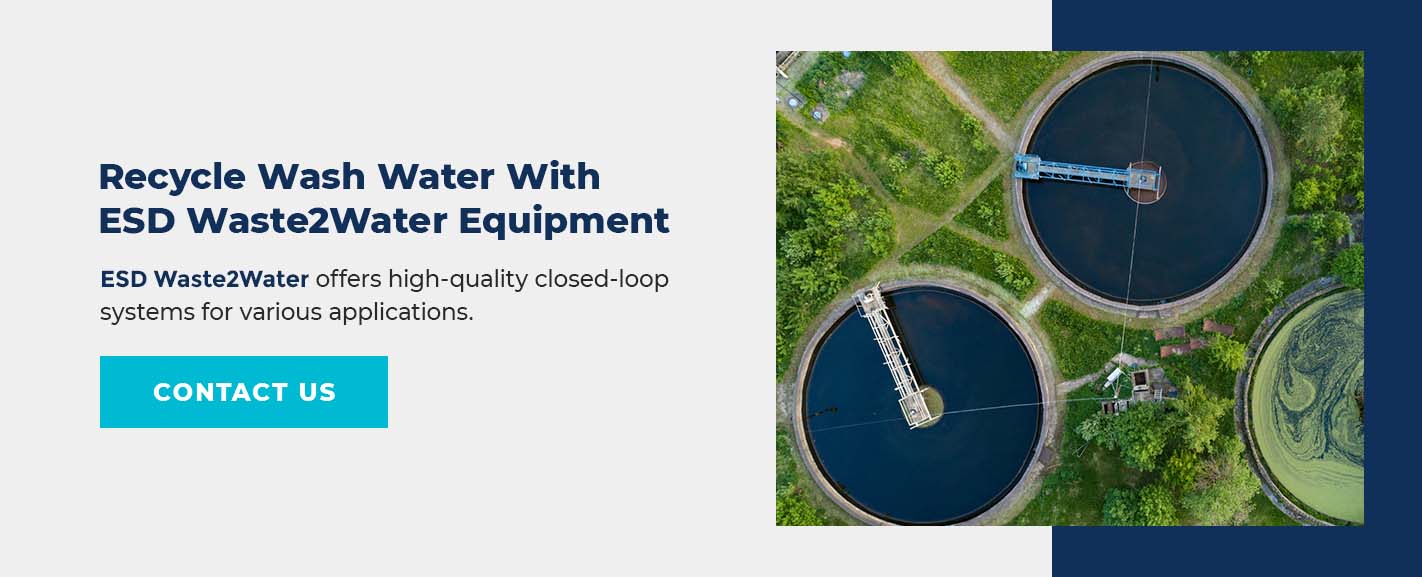
Recycle Wash Water With ESD Waste2Water Equipment
Wastewater is a result of necessary and unavoidable practices, but it’s possible to conserve fresh water and reduce wastewater. Industries that use wash water to maintain equipment and heavy machinery are especially responsible for conserving water because they use large volumes of water.
Wash water recycling is crucial because it protects the environment, conserves water resources and helps businesses save money. Recycling wash water allows companies to wash their equipment and use the same wash water repeatedly to avoid wasting water and prevent harmful contaminants from entering natural sources. Closed-loop wash water stations collect wash water and treat it before returning it for continued use.
With a closed-loop wash water station, companies can recycle wash water to protect the environment and save money. ESD Waste2Water offers high-quality closed-loop systems for various applications. Call 1-800-277-3279 or fill out a contact form to learn more about ESD Waste2Water’s wide selection of wash water recycling systems and how we can help design and configure the right system to meet your needs.

